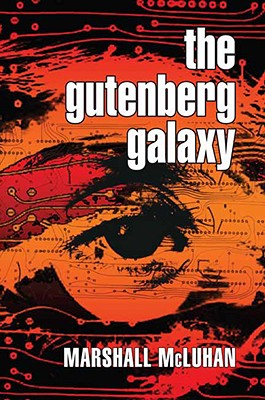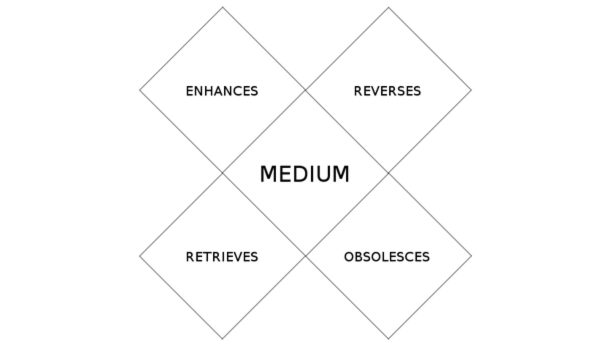The Mechanical Bride
 The main focus of the work was to analyze advertising and the influence on society. For example, McLuhan believed the comic strip character Dagwood Bumstead portrayed the feminized man who was emerging in society.
The main focus of the work was to analyze advertising and the influence on society. For example, McLuhan believed the comic strip character Dagwood Bumstead portrayed the feminized man who was emerging in society.
McLuhan, who had always been “fond of humour, laughter, and the use of cartoons and of jokes” (Theall 4), used pictures along with his ever-present puns and metaphors to grasp the attention of readers, while his text opened their eyes to the effects of advertising. McLuhan concludes his book by stating that “the medium of advertising was far more important than its contents.”
The Gutenberg Galaxy
 Written in essay style with short chapters, Galaxy is McLuhan’s dive further into his analysis of media. In Galaxy McLuhan presents his idea on history and cultural changes initiated by the Gutenberg press.
Written in essay style with short chapters, Galaxy is McLuhan’s dive further into his analysis of media. In Galaxy McLuhan presents his idea on history and cultural changes initiated by the Gutenberg press.
He proposes this invention caused a break between the older “oral” culture and the newer “print” culture (Witkoski, “Marshall”). McLuhan stated that “We are moving out of the age of visual into the age of the aural and tactile” (qtd. in Hipps 31). He went on to explain that the oral culture favored the ear and sound, while the print culture is dominated by the eye and sight.
Understanding Media
 Understanding Media is McLuhan’s explanation of the games which media plays as well as his explanation of media as extensions of man. According to McLuhan, games are “dramatic models of our psychological lives providing release of particular tensions” (qtd. in Theall 51).
Understanding Media is McLuhan’s explanation of the games which media plays as well as his explanation of media as extensions of man. According to McLuhan, games are “dramatic models of our psychological lives providing release of particular tensions” (qtd. in Theall 51).
From this point of view, McLuhan continues to explain that media, which he described as all things invented by man throughout history, have simply been recreations or improvements to the abilities of the body. The telephone was an extension of the human ear and voice; weapons were improvements on our teeth and fist. Technology, as McLuhan explained, was the recreation of the human nervous system.
The Medium is the Massage

His popularity gave access to a wide audience, obviously increasing his area of influence. After the spectacular sales of Understanding Media, “a steady stream of invitations for speaking engagements” (Gordon, “Marshall”) came his way. He was featured on NBC, quickly published another well-received book, The Medium is the Massage, and was awarded honorary degrees from dozens of universities.
He was now able to present his theories not just to a classroom of students, but instead to nations of people. Although many people were not able to fully grasp the meaning which lay under his deeply metaphoric speech, there were some who still worried about the implications of McLuhan’s ideas upon society.
Laws of Media
 McLuhan’s Laws of Media were presented as a scientific, yet practical method by which all people might analyze and understand media. His efforts to enlighten people about media and its effects were supported by the University of Toronto, where he had begun teaching in 1946. In 1963, the university asked McLuhan to head up their new Centre for Culture and Technology. Because of his concern that humanity was “shuffling toward the twenty-first century in the shackles of nineteenth century perceptions,” McLuhan made every attempt to open both his students’ and the public’s eyes to the effects which came with technology (Gordon, “Marshall”).
McLuhan’s Laws of Media were presented as a scientific, yet practical method by which all people might analyze and understand media. His efforts to enlighten people about media and its effects were supported by the University of Toronto, where he had begun teaching in 1946. In 1963, the university asked McLuhan to head up their new Centre for Culture and Technology. Because of his concern that humanity was “shuffling toward the twenty-first century in the shackles of nineteenth century perceptions,” McLuhan made every attempt to open both his students’ and the public’s eyes to the effects which came with technology (Gordon, “Marshall”).
The purpose of the Centre was to bring together scholars from all areas of study in order to determine the effects which technology would have on society, culture and institutions (Gordon, Marshall 193). One of McLuhan’s students, Tom Dilworth, remembered John Lennon visiting the Centre, noting that not just scholars visited McLuhan (23). During this time, McLuhan was often in demand, traveling throughout the school year to give talks.